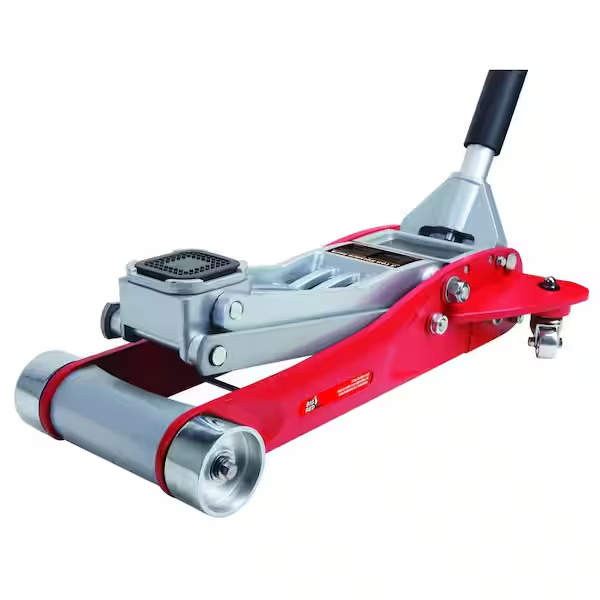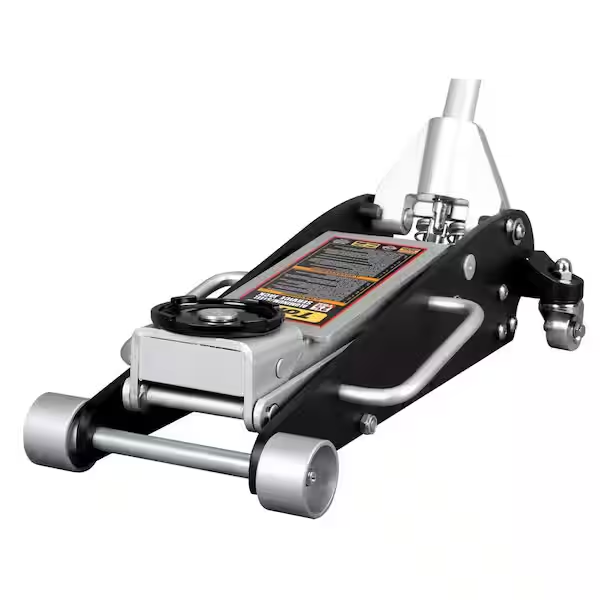Car repair requires the right tools. Safe and efficient car lifting requires a strong floor jack. With so many materials and designs, choosing a floor jack may be tough. To assist you choose a car floor jack, this page compares aluminum and steel.
Strength and Durability
Steel Floor Jacks

Automotive steel floor jacks are the epitome of durability. These heavy-duty steel jacks can sustain heavy weight without deforming or compromising. Professional garages and workshops use them because of their sturdy build.
Steel is strong enough to lift trucks and SUVs with confidence. Steel floor jacks assist automobiles safely during normal maintenance and major repairs. Also, steel floor jacks excel in harsh areas that require durability. Their durability makes them a long-term lifting solution. Steel jacks perform consistently despite their heavy build, making them essential for automobile enthusiasts and professionals.
Aluminum Floor Jacks
Aluminum is lightweight and durable, while steel is stronger. Premium aluminum alloy floor jacks are strong-to-weight. Although lighter than steel jacks, technicians and DIYers favor aluminum ones for durability and reliability.
Lightweight and agile aluminum floor jacks can carry huge weights. They excel at tasks that demand regular shifting or operating in tight places. Aluminum alloys also resist corrosion, ensuring endurance in harsh situations. Aluminum floor jacks also protect vehicle surfaces. Aluminum is softer than steel, thus lifting vehicles doesn’t ruin their appearance.
Portable and maneuverable
Steel Floor Jacks
Although strong, steel floor jacks are unwieldy. In compact spaces or while working alone, steel jacks are heavier and difficult to move. Steel floor jacks are heavy and hard to move in garages and workshops.
Steel jacks stay steady and support lifting, although their weight may limit their application. Steel floor jacks are sturdy, but their bulkiness can hamper mobility and efficiency, especially in fast-paced automobile environments.
Aluminum Floor Jacks
Floor jacks made of aluminum alloys are lightweight and portable. Steel jacks are heavier and harder to carry and position under cars than aluminum ones. This is great for mobile mechanics and individuals who operate on cars in numerous locations due to its quick setup and use.
Aluminium floor jacks are lightweight and easy to adjust in tight spaces. Aluminum jacks are versatile and improve productivity in confined garages and car service.
Resistance to corrosion
Steel Floor Jacks

Steel floor jacks are sturdy but can rust in moisture or harsh chemicals. Steel jacks can degrade and become unsafe without maintenance and rust protection. Rust can weaken jack components, causing lifting failure.
Steel floor jacks need regular cleaning, drying, and rust inhibitors to prevent corrosion. Clean the jack to prevent rust and corrosion. A protective coating or rust inhibitor can also protect against environmental corrosion forces.
Users that value strength and durability choose steel floor jacks despite their high maintenance requirements. Steel jacks can endure automobile maintenance and work reliably with proper care.
Aluminum Floor Jacks
Aluminum alloy floor jacks resist corrosion. Aluminium is adaptable since it doesn’t rust in dampness or corrosives. An good investment, aluminium floor jacks withstand corrosion and require little maintenance.
To prevent rust and deterioration, aluminum floor jacks require little maintenance. Aluminum jacks require less maintenance than steel ones, but occasional cleaning and inspection are still suggested.
No rust makes aluminum floor jacks suitable for outdoor or high-moisture conditions where steel jacks may corrode. Aluminum jacks last longer and look better, so you can work
in a humid garage or service cars outdoors.Cost and affordability
Steel Floor Jacks
Reasonably priced steel floor jacks are preferred. Due to availability and cost, steel jacks are cheaper than aluminum ones. Steel floor jacks offer economical, reliable lifting.
Although steel jacks are cheaper, their durability and value must be considered. Despite being cheaper, steel jacks may need more maintenance and replacement due to corrosion and wear. Maintenance and repair costs help determine steel floor jack ownership costs.
Aluminum Floor Jacks
Due to precision manufacture and aluminum alloy costs, aluminum floor jacks cost more than steel ones. Many users may find lightweight construction, corrosion resistance, and ease of use worth the initial cost.
Aluminum floor jacks are more expensive upfront but save money over time. Their small weight makes transport and operation easier and more efficient. Anticorrosion aluminum is durable and low-maintenance. Aluminum floor jacks may cost less to maintain and repair. Aluminum jacks are more expensive, but their greater performance and durability can save money over time.
Lifting capacity and height
Steel Floor Jacks
Due to their wider diameters and lifting powers, steel floor jacks can raise trucks, SUVs, and other heavy vehicles. Although lighter and smaller, aluminum floor jacks may not work for larger cars due to their decreased lifting capacity and height range.
Aluminum Floor Jacks
For different cars, aluminum and steel floor jacks exist in varying sizes and lifting capacities. It’s important to examine the floor jack’s minimum and maximum height range and lifting capabilities when buying one.
Maneuverability
Steel Floor Jacks
While sturdy, steel floor jacks can be heavy and difficult to move. When operating in tight spaces or trying to reach vehicle lifting points, their increased weight and wider footprint might make precise positioning harder.
Aluminum Floor Jacks
Some say aluminum floor jacks are more maneuverable than steel ones. Their tiny size and lightweight construction make them easier to place under vehicles and navigate tight locations. This is useful when working on cars with little ground clearance or in small garages.
Maintenance needs
Steel Floor Jacks
Steel floor jacks may need more maintenance due to rust. Clean, oiled, and inspected moving parts prevent jack rust from impairing safety and functionality.
Aluminum Floor Jacks
Aluminum floor jacks require regular maintenance despite corrosion resistance. Aluminum floor jacks last longer with regular cleaning, lubrication, and inspections.
Conclusion
Finally, aluminum and steel floor jacks have various benefits. Steel floor jacks are suited for heavy-duty use. Professionals and amateurs utilize aluminum floor jacks for portability, corrosion resistance, and utility.
Usage, lifting capacity, budget, and environment determine aluminum or steel floor jacks. Choose the right floor jack for strength, portability, or corrosion resistance to improve automotive maintenance safety and efficiency. This article’s perks and considerations might help you choose a floor jack that meets your needs.

